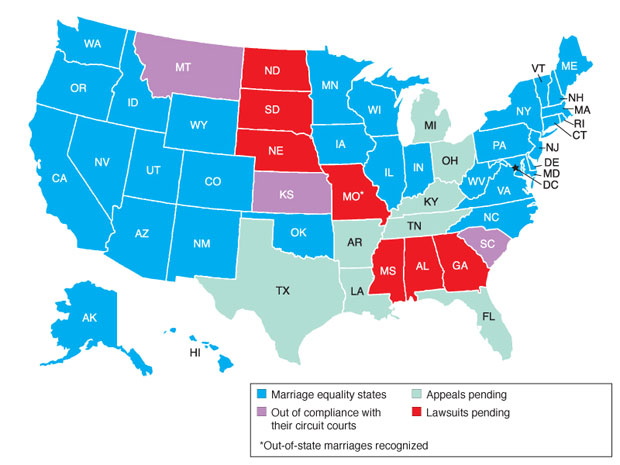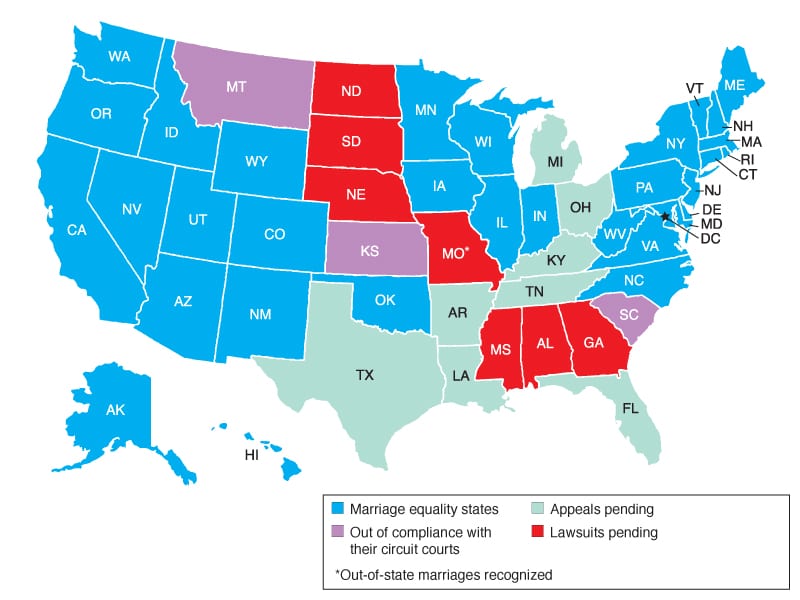In just two weeks, the number of marriage equality states jumped from 19 to 32, but Texas is not among them

GOIN’ TO THE CHAPEL | Whether it’s a wedding chapel in Vegas or a casino in Oklahoma, along the rim of Arizona’s Grand Canyon or near Old Faithful in Wyoming, gay and lesbian couples suddenly have lots of new options of where to marry. (Graphic by Erin Moore)
Four U.S. Courts of Appeals have yet to weigh in on marriage equality. Of the 11 districts, these remaining courts — 5th, 6th, 8th and 11th — are generally considered the most conservative.
Since the U.S. Supreme Court refused on Oct. 3 to hear appeals from five states — Oklahoma and Utah in the 10th, Wisconsin and Indiana in the 7th, and Virginia in the 4th — those states and most other states in those circuits have become marriage equality states, bringing the total from 19 to 32 in just two weeks.
Three more states should be marriage equality states soon because of positive rulings in their circuits.
5th Circuit
With two Lone Star State cases combined into one and moving through the court system, LGBT Texans are waiting now waiting to see if judges in the 5th Circuit Court of Appeals will follow the lead of other circuit courts so far and rule in favor of equality, or if the 5th Circuit will become the court to issue an opposite ruling and force SCOTUS to take up the issue.
The 5th Circuit Court, with jurisdiction over Texas, Louisiana and Mississippi, has agreed to expedite its hearing of cases from Texas and Louisiana after a couple from Austin filed a motion requesting they do so. One of the women involved in the Texas case is pregnant, and she’d like a quick ruling to allow her wife to adopt their new baby at birth.
The Louisiana case is one of just two in which a judge has ruled in favor of a state’s right to define marriage, even if the law discriminates. That judge dismissed the idea of animus — hatred — propelling the restriction. He also dismissed the idea of equal protection in the U.S. Constitution as relevant to the case.
The Texas Supreme Court also heard a case involving same-sex divorce.
Teena Callahan, a family court judge in Dallas, was among the first to rule the federal Defense of Marriage Act unconstitutional as part of her decision granting a same-sex couple a divorce. Texas Atty. Gen. Greg Abbott appealed the case and won in the state appellate court. That decision found the marriage was not recognized, so the dissolution of the contract between two men should be handled in a court that would handle business disputes.
That decision was then taken to the Texas Supreme Court last November, which still has not issued a ruling after almost a year.
4th Circuit
When the U.S. Supreme Court refused to hear the appeal from Virginia, the 4th Circuit’s ruling on the side of marriage equality was extended to three other states in the circuit — North Carolina, South Carolina and West Virginia.
South Carolina has so far refused to extend marriage rights and Lambda Legal has filed a lawsuit to force the state to do so.
North Carolina and West Virginia have complied, but North Carolina has filed an appeal.
The case still pending against North Carolina is different than others around the country. Brought by United Church of Christ and the Union for Reform Judaism, instead of by one or more same-sex couples, that suit charges religious discrimination because state law prevents ministers and rabbis from conducting weddings that their denominations allow.
10th Circuit
After the U.S. Supreme Court refused to hear the Utah and Oklahoma cases, Colorado jumped in as the next marriage equality state.
In Kansas, a judge ordered one northeast county to begin issuing licenses. One lesbian couple got married before the state cut off marriage equality and appealed.
The National Center for Lesbian Rights filed suit when Wyoming refused to issue licenses. After a week’s delay, that state became a marriage equality state.
9th Circuit
California, Oregon, Washington and Hawaii were already marriage equality states in the 9th Circuit.
When the 9th Circuit ruled against the Nevada and Idaho marriage laws, equality extended to Alaska and Arizona after brief appeals that were denied.
In Nevada — the state where prostitution has been legal since the 1800s and gambling since the 1930s — marriage has been more controversial, but the state decided not to appeal.
Claiming moral objections, some Las Vegas wedding chapels on The Strip along with some Elvis impersonators have refused to host same-sex weddings. They face misdemeanor charges of discrimination in public accommodations.
Before it became a marriage equality state, Idaho appealed briefly and lost.
Montana is the 9th Circuit’s only remaining holdout. Montana ACLU filed suit, so that state, along with South Carolina and Kansas should be the next three marriage equality states.
6th Circuit
The Sixth Circuit has heard cases from Michigan, Ohio, Kentucky and Tennessee but has not issued a ruling. That ruling could come at any time.
One Ohio case not appealed involves recognizing spouses for the purpose of a death certificate. The state is complying with that ruling.
8th Circuit
The 8th Circuit already includes two marriage equality states — Minnesota and Iowa. A case was heard in Arkansas and, before that District Court decision was stayed, about 500 couples married.
Cases are pending in lower courts in North Dakota, South Dakota, Nebraska and Missouri.
Although Missouri doesn’t allow same-sex marriage, it recognizes marriages from out of state and is the only non-marriage-equality state to do so.
11th Circuit
The 11th Circuit includes Florida, Georgia and Alabama. Lower court cases are pending in Georgia and Alabama. In Florida, the marriage ban has already been declared unconstitutional by several county courts as well as in U.S. District Court. Florida’s twice-divorced and three-times-married attorney general continues to defend “traditional marriage” as it’s existed since the time Florida’s “dissolution of marriage” laws were liberalized in 1971.
1st Circuit
A U.S. District judge in Puerto Rico ruled this week the territory’s marriage ban is legal. In his ruling, U.S. District Judge Judge Juan M. Pérez-Giménez said lower courts are still bound by Baker v. Nelson, a 1971 case that upheld same-sex marriage bans. He said the Supreme Court can overturn itself, but so far hasn’t.
The ruling is expected to be appealed and would be heard by the 1st Circuit that includes Maine, New Hampshire, Massachusetts and Rhode Island — all marriage equality states.
This article appeared in the Dallas Voice print edition October 24, 2014.

